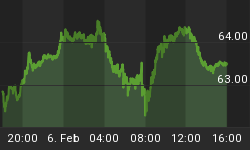It was Friday the 13th, but nothing particularly spooky happened. As far as I know.
I suppose there was one little spooky thing that happened with CPI (this is called "building suspense"). Although the number was generally about as-expected, with headline rising 0.3% and core +0.1%. (Can you feel the suspense building?)
Actually, Core CPI would have printed a tenth higher - it was +0.13% unrounded - except for a very interesting development (here it comes!): medical care prices fell last month (and now you feel disappointed. Robbed. I waited for that? Oh well...after all, it is economics).
How unusual is that? Well, that is only the third decline in the last 29 years, and only the second that was actually large enough to round to -0.1%. The last time medical prices fell further was in 1971. It is probably too early to celebrate the success of Obamacare and write letters of condolences to your doctor. The year-on-year inflation rate is up around 3.24%, and hasn't been below 2.48% since 1972. Oh, and that was in the middle of Nixon's wage and price control regime; two years later, once the shackles were taken off and official prices could rise to black-market prices, the rate of change for medical care was 12.3% and it peaked at an all-time high of 13.9% in mid-1975.
Medical care inflation is around 6% of the consumption basket, so if medical care prices had merely gone up at the +0.3%-per-month rate of the last year, core CPI would have printed at +0.2% and I wouldn't be the only person murmuring that we are probably close to a bottoming in core inflation. Sure, there are always lots of one-off ups and downs, and I'm not going to read very much into the one month wiggle of medical care. Over the long run - decades, that is - Medical Care CPI has tended to run around 2% faster than headline CPI. I very much doubt that is permanently changing right now.
There was another peculiarity in the data today, and that was that the University of Michigan confidence number was stronger-than-expected at 69.6. That's odd because confidence usually goes hand-in-hand with jobs, and recent indicators on that front have been decidedly unfortunate. Actually, this is a good time to point out how my approach to the data has changed recently.
I try to always remember that economic data are not "truth," but rather little samplings of the underlying reality. We're not testing the whole Martian landscape; we're taking a few tiny scoops of sand and conducting tests. As with the test of Martian soil, when we get a result we should not suddenly declare that "this is so," for after all it is just a tiny sample of a vast and complex landscape. What those results can do is to give us some clues, and actively refute some theories we may have had. If we thought Mars was made of feathers, a single scoop of soil should be sufficient to reject that hypothesis. Most hypotheses, of course, are close enough to reality that it can be difficult to refute hypotheses, and in economics (unlike in the multibillion-dollar interplanatary science packages) we don't get to design our tests to address the questions we want to have answered. That does not diminish, however, the importance of an operating hypothesis.
Until recently, my operating hypothesis was that the economy had pretty much returned to the state of weakness it had displayed prior to Lehman's demise and the general disaster that was Q3-4 of 2008. The financial crisis, and the huge fiscal and monetary policy actions, sculpted a deep drop and a sharp recovery, but the recovery wa only sharp because the drop was so deep. We were stuck at 460-470k Initial Claims, and just going nowhere. In that context, I would simply have ignored the Michigan number completely as being irrelevant.
Recent data, not just Claims but some others as well, have changed my operating hypothesis to being that the economy is fading further. Whether this is because the stimulus continues to ebb, or because monetary policy has been too tight with M2 growth in the 1-2% range, I don't know. It may also be that businesses and households are hunkering down to prepare to ride out the big tax hike that everyone knows is coming in early 2011. But the point is that the trajectory is downward again, or anyway that is my operating hypothesis.
The Michigan number doesn't cause me to seriously question that hypothesis, because even with the bounce it is well below the number of 2 months ago and floating around year-ago levels (see Chart, source Bloomberg), but in the context of my hypothesis it bears observation as a tiny discordant note. Enough of those notes would cause me to reject my hypothesis - but it will take quite a few.

A Michigan bounce, but not nearly enough to change my current hypothesis.
On the week, stocks fell four out of five days and ended nearly 4% lower. Moreover, the VIX rose and yields fell with the 10y down to 2.69%. The Fed's operating hypothesis, too, appears to have changed; we will now find out how quickly their actual operations will change. It will not likely be quickly enough to prevent further losses in equities during another late-summer week. After all that has happened, "sell in May and go away" seems to have turned out to be the right idea after all.
Thanks everyone for your help on the poll this week. I am up near 300 responses and still looking for more, more, more. The URL to the poll is http://poll.fm/f/25auj and it is embedded below - feel free to send it to anyone. It will be open for a few more days, and so far the results tend to support (or rather, to not reject) my hypothesis. I will write about that hypothesis when I describe the research next week.















